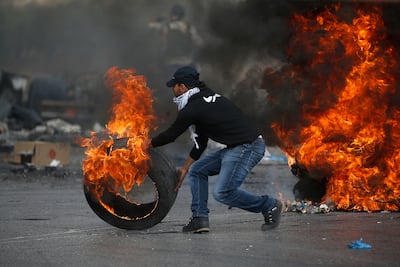A little more than four months ago, The National reported how Israel’s military used an Apache attack helicopter to fire missiles above the occupied West Bank city of Jenin. Many were shocked at the escalation; it was the first time such firepower had been used by Israel since the Second Intifada 20 years before. Fast forward to Sunday, and the level of force being used in the West Bank has only increased: a senior Palestinian official said that an early morning strike by Israeli F-16 warplanes destroyed a mosque in the Jenin refugee camp and a residential building nearby.
Much of the world remains transfixed in horror at the continuing suffering of civilians in Gaza plus the grim wait for an expected Israeli ground invasion. In addition, the violent exchanges taking place along the Israeli-Lebanese border and the possibility of a regional conflict have captured the focus of many diplomats, politicians and analysts. Amid the chaos, the current turmoil in the West Bank has been somewhat overshadowed. This is understandable but a mistake.
Decades of occupation, the cantonisation of Palestinian land by settlers, the subjecting of Palestinian civilians to Israeli military law as well as chronic economic problems such as unemployment and poverty have all left the West Bank more volatile than ever. This risks creating a third front for an Israeli military that is already on collision course with a host of enemies.

Although there have been attempts to splinter Palestinian society into two entities over the years, those in the West Bank still feel a strong sense of kinship with their family, friends and compatriots in Gaza. As one Bethlehem resident told The National recently: “If Gaza falls, we will suffer immeasurably.” What is taking place in Gaza will have serious repercussions in the West Bank.
The Palestinian Authority has shown itself unable to challenge Israel or to thwart the settlement building that has hamstrung the idea of a truly independent Palestinian state. It has also been outmanoeuvred politically, and many Palestinians are acutely aware of this powerlessness and failing leadership. The idea of law and order in the West Bank has broken down, as Palestinians are harassed, attacked and sometimes killed with impunity.

Into this vacuum have stepped several armed factions that act independently of the Palestinian Authority and are, as in Jenin, further adding to a powder-keg situation. This is nothing to say of the situation in Jerusalem where anger at the seizure of Palestinian homes by Israelis has added to the resentment caused by provocative and inflammatory visits to Al Aqsa Mosque by extremist Jewish Israelis, facilitated by the security forces. The fact that Hamas’s October 7 attack was called Al Aqsa Flood shows how the issue of Jerusalem remains a key part of the conflict.
Israeli governments have ignored repeated warnings and advice from Arab countries concerning Jerusalem and the West Bank for years. Meanwhile, settlers, who now have representation at the highest levels of Israel’s government, have entangled the Israeli state in decades of West Bank unrest. Several critical voices in Israel have already attacked what they see as the misuse of the country’s military to protect and enable the settler project in the West Bank, leaving the border with Gaza relatively unprotected. The acute violence witnessed in Gaza has only exposed Israeli strategic failure in the West Bank, too.
Right now, much of the focus is on finding a way to reach a ceasefire in Gaza and to get critical humanitarian aid to millions of civilians. And rightly so. But October 7 was a pivotal moment, and there should be no going back to the failed policies of the past. Finding a new path forward to tackle the underlying causes of the Palestinian-Israeli conflict is vital – and this means ending the mistreatment of Palestinians in the West Bank who have been living under the world’s longest military occupation. The tragedy is that it took a full-scale war in Gaza and the deaths of many Palestinian and Israeli civilians to end years of political neglect and bring the long-simmering situation in Palestine to light.














































